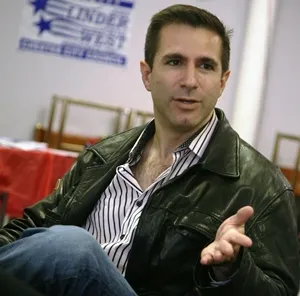Political Scientist Ben Berger Concerned About Less Energy Among Young Voters

Philadelphia Inquirer: Why Disillusioned Young Voters May Abstain from the Polls
Ben Berger, a professor of political science at Swarthmore, can tell that his students are not as politically energized as they were four years ago, just by what kind of volunteerism they choose. Berger's class, Democratic Theory and Practice, requires students to work on some type of civic engagement. In '08, students flocked to do voter registration and mobilization. This year, not so much.
"I think they're weary" because of the grueling, heated nature of a long, hard-fought campaign, Berger says. Plus, students don't see Obama as the rock star he was in 2008.
"The luster is gone for Barack Obama," Berger says. "They may think he's still right, but they don't think he's as cool."
Cool points didn't come up in the talking points of a panel of political science and anthropology professors who discussed the moral differences between liberals and conservatives at Swarthmore College over the weekend. But the roots of our negative discourse did.
The forum was based on The Righteous Mind, a book by the social psychologist Jonathan Haidt, who seeks to explain why human nature informs our political discourse. For instance, Haidt says, conservatives value loyalty, authority, sacredness, and merit, while liberals value universality, progress, rationality, and equality.
Well, I don't necessarily buy that. Neither does political science professor Carol Nackenoff, who says Haidt's book is silent on the values that women hold. She points out that according to a Rutgers University study, women are more likely to support programs that guarantee quality health care and basic human needs; they're more supportive of restrictions on firearms, and more likely to support affirmative action and racial equality. Regardless of whether they're Democrat or Republican.
"Everybody has moral virtues," says Berger. "But it's another thing to call them political virtues and try to enshrine them through government."
The trick, then, is to figure out a way to talk to each other despite political inclinations. "We can argue about issues of fact without calling our opponents twisted or evil," Berger says. ...
Associate Professor of Political Science Ben Berger is one of 26 Periclean Faculty Leaders nationwide and directs Swarthmore's Engaging Democracy Project, a program designed to promote community engagement, political participation and responsible citizenship in the classroom, on campus, and in the wider community. His award-winning book, Attention Deficit Democracy: The Paradox of Civic Engagement (2011), analyzes citizens' inattention throughout history up through the present day.
The Righteous Mind Symposium has been made possible with funding and administrative support from the Swarthmore College Institute for the Liberal Arts, which serves as a framework for the College to explore the liberal arts model and the sector's relevance to the wider community.



